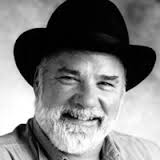Someone, (who?) said that writing humour was the most difficult task. I remember talking to Arthur Black who told me he keeps a clipping file of news stories that could spark a humorous article. He also said stories about pets or sex or greed often lead to pretty funny observations. A shy guy himself, and a long-ago resident of Thunder Bay, Arthur is one of my favourite humorous writers.
John Pringle's stories often contain a dead pan humour that is John's own. His book Truth Ratio (published by Emerson Street Press) has several such stories. Then there is Janet Evanovich, my favourite funny mystery writer.
Sometimes you hear funny true stories. And everyone knows there are a lot of funny stories in Thunder Bay! Here is a recent one that still cracks me up, in a sort of WTH?way. A young woman offered to drive an older woman, a fellow worker at the same establishment, to the annual Christmas party. The woman asked my friend if she would mind stopping at a house. It turned out to be a wake, of the old fashioned sort. So my young friend found herself staring at a man, the deceased, lying in an open casket, surrounded by grieving relatives none of whom she knew. All she could think to say was, Merry Christmas.
Get a few Thunder Bayers together and in time the funny and true stories start to fly.
Below, blogger Mia Botha of Writerswrite, tips the jester's cap.
Favourite Books
I've recently revised my list to include the books that I have read this past year and I have noticed something that I haven’t before. The books I like are funny. . I do believe everyone can be funny or at least funnier than they are now. I don’t think anyone plans to be funny, because humour is opportunistic. It’s up to you to identify those moments or opportunities.
It is also important to find your kind of funny.
Think of what makes you laugh, and that will steer you in the right direction. We can’t all be Leon Schuster and personally, I think one of him is enough. Do you like Monty Python or Ellen DeGeneres, Robin Williams or Woody Allen? Each one has a different style or kind of humour. Humour can be over-the top, slapstick, sarcastic, subtle or inappropriate. John Green makes you laugh through your tears, Janet Evanovich is like Bridget Jones on steroids and Jenny Lawson is ridiculously inappropriate. But what works for you? You might find that you like a certain kind of humour, but when you write yours, it’s totally different. As much as I love John Green, I suck at sad stories so the chances of me making you laugh and cry are slim, unless my writing is so bad you don’t know if you want to laugh or cry.
Pay attention to you what you say.
Often we say funny things but when we write we can’t do it. When you crack a joke, make a note of it. If you and a friend manage to get the people around you to laugh, start recording your conversations. I have a friend who can make up fantastic things with me on the spur of the moment. I call her when I get stuck and start a conversation with:
“I think the trolleys at Pick and Pay are programmed to kill me.”
“I know. It happened to me once at a wedding, the dessert trolley attacked me and I landed face first in the wedding cake.”
“Wow, was this before or after the alien abduction?”
“After, but before the lobotomy.”
“You had a lobotomy? I never noticed.”
“It’s because I have such a strong personality.”
And then we laugh and start talking about My Little Ponies. This is of course the PG version, our actual conversations are way more crass and inappropriate but it gets my gutter-prone brain going.
My 11 tips to get you started
- Take something familiar and turn it on its head. Use traditional metaphors and clichés and give them odd endings. Example: What does not kill you makes you stranger.
- Study jokes and their structures. Write your own using that formula.
- Take a boring piece of writing and try to rewrite it so that it is funny.
- Study comedians. Listen to their pace. Learn where to pause and when to speed up.
- Be as specific as you can. As with all writing, don’t be generic. Strong verbs and nouns are more important than ever.
- Make sure humour suits your narrative. If you are writing a funny story, start funny and stay funny.
- Don’t be funny for the sake of funny, unless you are writing a joke book. If you are writing fiction, you still need a beginning, a middle and an end; not a series of jokes or funny situations that get you to 50 000 words. You still need a goal and a conflict.
- Use the Power of Three: List things in threes. The first one makes you grin, the second should you smile and the third should make you laugh.
- Repetition and word play are great tools. Even if you can’t tell/write a joke wonderful things can emerge when you start playing with your words.
- Think of Friends, The Big Bang Theory or the last comedy you watched. How did they build it up? How did they structure the joke? Also be kind to yourself, those shows and movies often rely on teams of writers.
- Practice, practice, practice.










































































































































































































































































No comments:
Post a Comment